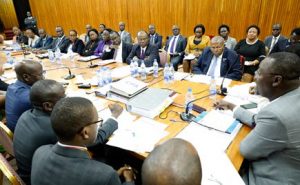
The Parliament’s Committee on Commissions, Statutory Authorities and State Enterprises (Cosase) threw out Bank of Uganda Governor, Tumusiime Mutebile and his Deputy, Louis Kasekende on Friday last week, over failure to present documents on the takeover and eventual sale of seven defunct banks.
It has now come to this newspaper’s attention that documents on the buyer of three of the said banks – an offshore company in Mauritius have vanished in their Ugandan custodians just as the company itself.
Nile River Acquisition Company (NRAC), an offshore tax haven registered in Mauritius acquired the assets of the assets and liabilities in the sale of International Credit Bank Ltd (1998), Greenland Bank (1999) and the Co-operative Bank (1999) at 93% discount but according to highly places sources this newspaper has talked to, no relevant government agency has any records of the transactions.
Credible sources have revealed that NRAC, which assumed whatever was left of the three closed banks in 2007, was incorporated in Mauritius on September 26, 2007, as a global business, the same year BoU officials sold the assets of the three banks.
The three banks had a total loan portfolio Shs135bn, including secured loans of Shs34.5bn which had valid, legal or equitable mortgage on the real estate properties.
NRAC has since been deregistered meaning that all information about the directors, including the particulars of individuals who dealt with Bank of Uganda officials in the sale of said banks, is unavailable.
Authorities in Mauritius where the company was registered have expressed no interest in divulging any information about the defunct company.
According to H.A.Chaumun, the chief compliance officer for Corporate and Business Registration Department of Mauritius, NRAC has been removed from the register of companies thus “any information on its directors is strictly confidential.”
Although the law requires that any foreign company must register locally before it can be allowed to transact business in Uganda, there is no record of NRAC in the central government registry and, therefore, no particulars of its owner(s) or director(s).
Neither the Financial Intelligence Authority (FIA), which among other things monitors cash inflows and outflow into and from Uganda nor the Uganda Revenue Authority (URA) have any records on the said company.
According to analysts, the tax haven could have been founded by Ugandans who ended up buying treasured assets of the closed financial institutions at a giveaway price.
BoU’s Communications Director, Charity Mugumya, could not comment on the “mysterious ways” of NRAC but told this newspaper that the banks were sold at cheaply because the liquidator had waited for eight years to realise the said loans in vain.
“NRAC was aware that it was buying a loan portfolio, which was difficult to recover. As a result, it paid a low price for the loans,” she said.
As the probe into the sale of Crane Bank and six other banks continues, the lawmakers will look to task the already embattled Central Bank officials to explain how the said transactions transpired and who was involved.
